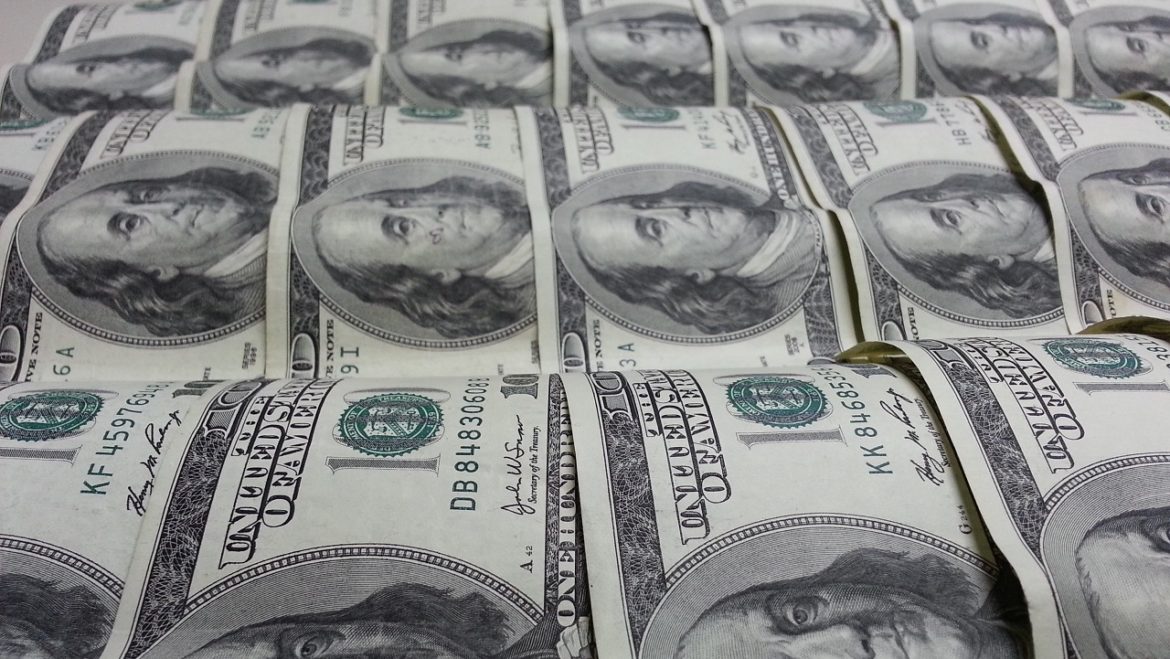Gold has all the potential to go unprecedentedly high. But silver will be gold on
Site:
Precious metals news
Oct 31, 2023 - 07:16:24 PDT
IRS Commissioner Danny Werfel faces tough questioning over potentially breaking a pledge by auditing Americans earning under $400,000, risking the agency's integrity and fueling concerns that the IRS will disproportionately target lower earners in its enforcement ramp-up. Despite previous assurances, a watchdog warns the lack of a clear "high-income" definition could ensnare those with lesser incomes in the agency's dragnet, potentially contradicting promises and undermining taxpayer trust.
Oct 31, 2023 - 06:40:17 PDT
Stanley Druckenmiller blasts Treasury Secretary Janet Yellen for a colossal oversight in not locking in low rates with long-term bonds amid the pandemic, a move he brands as arguably the worst Treasury blunder ever. As a result, he predicts a grim future where soaring interest costs strangle the federal budget, dwarfing discretionary spending and burdening generations to come with unsustainable debts.
Oct 31, 2023 - 06:29:31 PDT
Under Bidenomics, the rich get richer, and the middle class suffers with unaffordable housing—median income at $78,000 can't keep up with the $111,000 needed to buy a home. Credit card delinquencies are the highest in over three decades, and the interest on the national debt for 2023 matches the entire debt from 1980. Investments faltered in 2022, and while Bitcoin, NASDAQ, and gold are up in 2023, Treasuries and REITs lag with losses over -10%.
The financial strain on American households is intensifying, with 62% living paycheck to paycheck amidst relentless inflation and rising interest rates. Despite static income levels, the cost of necessities is forcing many to defer essential spending and deplete savings, with 49% reporting lower reserves than a year ago. Economic indicators suggest a grim outlook, with real earnings declining and the Federal Reserve signaling rates will remain high, exacerbating the financial distress for the majority already in a precarious position.
 It’s INCREDIBLE What Is Going On With GOLD… We Could See A Breakout VERY SOON
It’s INCREDIBLE What Is Going On With GOLD… We Could See A Breakout VERY SOONOct 31, 2023 - 06:17:01 PDT
Discover the incredible insights shared by Tavi Costa in this thought-provoking discussion about the gold market.
The Federal Reserve is in a dire situation, grappling with an economy battered by persistent inflation and volatile markets. Despite economic growth, the specter of unyielding inflation persists, casting a long shadow over the Fed's ability to manage a soft landing. With investor nerves frayed and borrowing costs soaring, the risk of tipping into a deep recession looms larger, questioning the efficacy of the Fed's toolkit in this fraught economic landscape.
 Middle-Class Sentiment Shaken of Feds' Ongoing Battles with Rising Inflation
Middle-Class Sentiment Shaken of Feds' Ongoing Battles with Rising InflationOct 31, 2023 - 06:03:11 PDT
Rising interest rates are pushing middle-class Americans to the brink, with a Harris Poll for Bloomberg highlighting deeper anxieties. Higher borrowing costs have hit 57% of families, with credit card interest and fees alone costing a record $130 billion last year. Groceries and utilities add to the squeeze, as households feel increasingly left behind with stagnant wages failing to keep up with surging costs. Economic optimism dwindles as the middle-class struggles become a stark reality.
Oct 31, 2023 - 05:58:48 PDT
Wall Street banks predict the U.S. Treasury's massive borrowing needs will continue, with estimates of $1.5 trillion needed through early 2024, exacerbating the steep increase in long-term yields to the highest since 2007. This borrowing surge is straining the Treasury market and poses sustainability concerns, with Treasury yields peaking and stocks closing lower amid ongoing financial stress.
After setting a record through the first half of the year, central banks continued to gobble up gold in the third quarter.Globally, central banks added a net 337 tons of gold in Q3, the second-highest third-quarter total on record behind 2022.Through the first nine months of the year, central banks bought a net of 800 tons of gold. That's 14% more than through the same period in 2022.
Does the massive national debt matter?A lot of people don't think it does, at least not yet. They point to Japan as an example of a country that has a much higher debt-to-GDP ratio and is doing fine. Peter Schiff said they're looking at the wrong country. The US is more like Argentina than Japan.
 Record Central Bank Gold Buying As U.S. & ECB Continue To Print Enormous Amount Of Treasuries & Bonds
Record Central Bank Gold Buying As U.S. & ECB Continue To Print Enormous Amount Of Treasuries & BondsOctober 31, 2023
Central banks purchased the most gold over the past year, as the U.S. and ECB printed trillions in new treasuries and bonds. It seems as if many central banks are becoming worried that U.S. Treasuries may no longer be safe assets in the future. I agree...
Oct 30, 2023 - 12:42:59 PDT
Amid Middle East tensions and European recession fears, spot gold prices soared over 10% in a month, from $1,815 to around $2,000 per ounce, the highest since May 2023. Bloomberg's Mike McGlone suggests gold could potentially reach $3,000 by 2024, especially if the anticipated US recession hits by year-end. Contrarily, US equities are facing a sell-off, with expectations of a brief rally before a continued bear market into 2024.
Oct 30, 2023 - 12:33:09 PDT
Renaissance Macro Research warns of a triple threat to the US economy: escalating debt, rising interest rates, and protectionist trade policies. These factors are expected to shape the economic and investment climate for years, with the federal debt at $33 trillion and interest rates increasing the cost of government debt. Protectionist measures could further strain the economy by raising costs and fostering dependency on government aid.
Oct 30, 2023 - 12:27:42 PDT
Senator Paul criticized excessive government spending on international aid in a Fox News interview, stating it threatens national security and could lead to the country's bankruptcy. He highlighted the national debt as a major risk, pointing out recent borrowing of a trillion dollars. Paul also noted a shift in policy with the new Speaker, Mike Johnson, blocking further large-scale funding, specifically an additional $60 billion for Ukraine.
Oct 30, 2023 - 09:13:30 PDT
U.S. cardholders faced a burdensome record high of $130 billion in credit card interest and fees in 2022, reflecting a distressing trend as debt soared and interest rates climbed amid the Federal Reserve's inflation measures. This financial strain, highlighted by the Consumer Financial Protection Bureau (CFPB), has exacerbated the challenge for Americans struggling to manage rising debts and punitive costs.
US inflation and consumer spending rose, signaling potential further rate hikes. UK employment dropped again, and Israel cut growth forecasts amid conflict. The US economy grew sharply, but deficits widened, pushing treasury yields higher. Global economic signals remain mixed, with central banks worldwide monitoring the situation closely.
Bankers and investors are wondering when something will snap. The significant drop in government bond prices, particularly with U.S. Treasury yields rising above 5% for the first time since 2007, has caused unease among bankers and investors. Despite market moves being orderly, there's a quiet alarm over the state of corporate debt due to increasing borrowing costs and a slowdown in bond issuance. Defaults are up notably, with distressed exchanges hinting at deeper issues for companies under financial strain. This tension in the bond market is a clear sign of stress, even if a full-scale disaster has not yet unfolded.
The U.S. is masking economic weaknesses through borrowing. Despite high GDP growth and low unemployment, real wages are down, and consumer spending is debt-fueled, with credit card debt hitting new highs. Investment is declining, and government spending is artificially inflating GDP figures. The growth of public debt far outpaces GDP growth, signaling a potentially weaker economy ahead.
Rising interest rates pose significant threats to the economy and markets, magnified by the rapid pace of increases and prior risk-taking spurred by extreme monetary policies. Corporate debt, inflated by previously low interest rates, may become burdensome as higher rates increase the cost of debt servicing. This is also disrupting the long-term treasury market. Furthermore, the stock market is starting to acknowledge that the new higher "risk-free" interest rates are becoming a formidable alternative for investors, challenging the attractiveness of stocks for the first time in years.
Oct 30, 2023 - 06:21:47 PDT
Gold's value should be primarily viewed as a barometer for monetary instability, not merely as an inflation hedge. With ample global financial turbulence, it's crucial to highlight gold's role as a safeguard in times of economic disarray. The last fifty-plus years since the gold standard was abandoned could be seen as a mere blip in monetary history, with indications that the era of unrestrained paper money and excessive sovereign debt might be judged harshly by future historians. This suggests a potential pivot back to gold as a critical asset in response to unchecked monetary policies.






